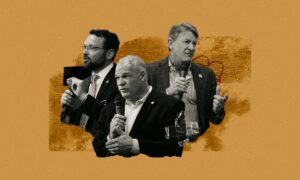It was a mythbusting night in the Navy Yard last week.
On February 1, the Millennial Debt Foundation gathered a collection of elected officials, policymakers, and our Commissioners, along with several members of Maverick PAC. Speakers and guests included Senator Joe Manchin, Congressmen Dan Crenshaw, Dean Phillips, Mark Green, Tim Burchett, and Congresswoman Nicole Malliotakis, along with former policy directors, congressional and presidential advisors, and world-class economists. All were joined together to celebrate the release of What We Owe the Future – a set of 10 common-sense proposals to stabilize our national debt and reorient our nation’s financial trajectory.
The result was a resounding, non-partisan call for responsibility, stewardship, and a resolve to leave America better than we found it.
Along the way, we laid a few myths happily to rest.
Myth #1 – The Debt is a Political Nonstarter.
Debt discussions too quickly devolve into partisan line-drawing and refusal to negotiate (ehem, #SOTU2023, ach – sorry, something in my throat).
When this happens, it is the nation that suffers.
Senator Manchin recalled the words of Admiral Mike Mullen, former Chairman of the Joint Chiefs of Staff, who once said to him that the greatest threat our nation faces is the exploding national debt. Admiral Mullen was certainly in a position to know about threats, and he said this a decade ago, when the debt totaled a mere $13 trillion!
WWOtF contains a set of proposals that can stave off the worst consequences of our runaway deficits without sacrificing the interests of anyone who currently depends upon the government for basic welfare.
Grandfathering in needed mandatory spending reform will allow us to protect those who need us most while bringing about the reforms that protect the long-term interests of everyone.
Proactive work on these issues is in everyone’s best interest.
As a result, we have found lawmakers from both parties willing to assist our efforts. Democratic congressman Dean Phillips joined Mark Green and Tim Burchett, Tennessee colleagues from across the aisle, to decry partisan gridlock around an issue that every lawmaker should want to solve.
Millennials are going to ensure this problem becomes an issue. Poll results around their views on debt and deficit are totally misleading.
With very little of the experience their ancestors had of inflation, interest rates, and stagflation, they already see budget deficits as a very big problem. Existing economic headwinds promise to enhance that concern.
Our bipartisan panel was correct about the need for a new politics around our nation’s fiscal health, and we commit to helping them overcome the impasses that haunt our politics.
Myth #2 – Entitlement Reforms are Regressive
The refusal to negotiate on long-term mandatory spending will hurt those who need our safety net most of all.
Make no mistake — the refusal to address mandatory spending is a de facto vote against the Americans who need help.
Lawmakers who make a show of refusing to negotiate are in actual fact putting the interests of our most vulnerable at risk. The reforms WWOtF counsels are both possible and necessary.
We thank Congressman Dan Crenshaw and Congresswoman Nicole Malliotakis, who joined us in continuation of their leadership in raising this issue.
Within a decade, the trust funds of our two largest safety net programs will become insolvent. This will trigger immediate and indiscriminate cuts. Reformers want to aim those cuts away from those who can least afford them.
It is becoming clear that those who blatantly refuse to negotiate cannot seriously claim to advocate for those whose interests they put at risk by their refusal.
Intransigence is regressive, irresponsible, and dangerous.
Myth #3 – Millennials are Disengaged
If the last two years of our work have shown us anything, it is that millennials – half of whom have children now – are invested in the future of their country.
We have found that our Debt Commission represents a large number of concerned citizens who, up to now, have not been activated politically.
They are repelled by extremism, pandering, and tribalism. They are attracted to politicians who, like them, work around disagreement for the sake of something larger.
And alongside us, they are entering the fray.
This is good news for solutions-oriented pragmatism and bad news for what has become politics as usual during the last couple of years.
Check out the video below to learn more about our event last week. And click here to get your own copy of our policy recommendations booklet, What We Owe the Future.



